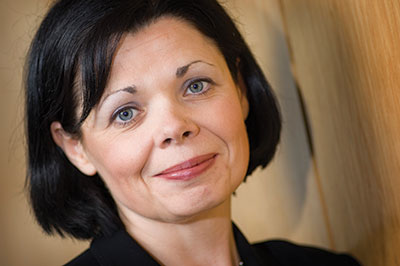Isolation rooms have a “huge impact on young people’s self-esteem, well-being and feelings”.
That’s the view of Jolanta Lasota, chief executive of the charity Ambitious about Autism.

Jolanta Lasota, Ambitious about Autism chief executive, says autistic pupils are being informally excluded in isolation rooms
Lasota says school staff often use isolation rooms to manage behaviour, but “the result is the informal exclusion of autistic pupils from their lessons and peers”.
‘More inclusive approach needed’
Staff take pupils to seclusion or isolation rooms to separate them from classmates.
Lasota says some pupils may benefit from time away in a “breakout or sensory room” when distressed.
But she says there is an important difference between autistic pupils “choosing to take themselves away” and “being put in isolation against their will”.
Schools need to have a more inclusive approach, based on better training, says Lasota.
Disabled children more likely to suffer
Scottish charity Positive and Active Behaviour Support Scotland (PABSS) campaigns for a reduction in the use of restrictive practices. These routines can involve seclusion, isolation rooms and restraint.
Research by the charity has shown disabled children are far more likely to find themselves in an isolation room or being restrained by school staff.
In a poll of 403 families of special needs children between 9 and 13 March this year, PABSS found 62 per cent said their child’s school had restrained or secluded them.
The charity says 93 per cent of the children are 11 years of age and under. Some 20 per cent were only six years old.
‘Primary schools are the problem’
Beth Morrison, head of PABSS, has said primary schools are the problem, as the statistics rise from age four to eight, before decreasing.
She has long maintained that an element of cowardice underpins restraint and seclusion. This was because staff target small children, while they find other ways to manage them when they become much bigger in adolescence.
Labour MSP Daniel Johnson has put forward a private member’s bill to toughen the law on restraint and seclusion in Scotland.
And the Scottish Government has said it wants to strengthen the law in this area. It says restraint and seclusion should always be a last resort.
Morrison has said the UK and Welsh governments are also considering new guidance on restraint and seclusion, as is Northern Ireland.
Related:
- Mum slams plans for reform of restraint
- Politician aims to tighten restraint law
- Discrimination rife in NI schools
- Politicians back crackdown on restraint
- Call for tight rules on school seclusion
- School pupils ‘suffer broken bones’
- Mum in court move over school restraint
- Legal plan to protect our schoolchildren
- Nine in ten disabled children restrained
- Protest at chill-out room reforms
- Dad demands tougher laws on restraint
- Mum reports school for restraining son
Published: 18 October 2023

















